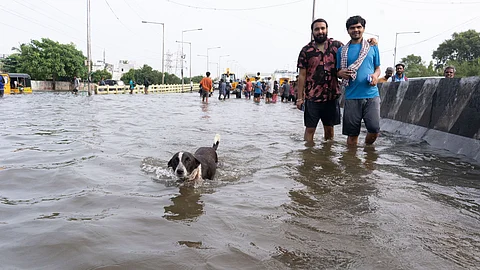

Chennai has recorded historic rains in the space of just 36 hours as Cyclone Michaung treaded slowly past its coast. The city as a whole received around 45 centimetres of rain between Sunday and Monday night, bringing it to complete halt before the incessant showers stopped. While the encroachment of water bodies and lack of urban planning are definitely reasons for the partial submersion of the city, experts say that the impact of climate change is clearly linked to this extreme weather event.
Cyclone Michaung is the fourth tropical cyclone over the Bay of Bengal this year and such storms are characterised by a warm core. Studies show that the cyclone gets its energy from the latent heat released when water vapour that has evaporated from the ocean surface condenses into liquid water. This essentially would mean that the warmer the ocean water, the stronger the cyclone.
Further, a report by Climate Trends, a research based consulting initiative shows that El Nino indices (Nino 3.4) have crossed 2°C for the first time since February 2016, after the super El Nino of 2015. With increasing sea surface and air temperatures across the world due to anthropogenic emissions, the intensity and resultant destruction caused by cyclones have become manifold.
“This rain was not a routine spell,” confirms Mahesh Palawat, weather expert and meteorologist of Skymet Weather Services. “December is definitely a month where cyclonic storms head towards Tamil Nadu and Andhra Pradesh, and the formation of the storm itself does not signify any abnormality. But the intensity of the rains associated with the cyclone is caused by climate change,” he said.
Chennai’s Perungudi area recorded 44 centimetres of rain while Meemambakkam came a close second at 43 centimetres, according to a statement released by the state government. To put this in perspective, the overall average rainfall estimated from the northeast monsoon season is 449 millimetres and 784 millimetres for Tamil Nadu and Chennai, respectively. In short, Chennai received over 50% of its rainfall in just less than two days.
The meteorologist further adds that such cyclones are now bound to become common as warming continues to take place across the globe.
“When air temperatures increase, its capacity to hold moistures rises too, leading to more extreme events,” he explains.
Professor Kurien Joseph who heads the Centre for Climate Change and Disaster Management at Anna University in Chennai too links the cyclone to global warming.
“It is well researched that climate change can cause the number of rainy days to reduce but increase the intensity of rainfall. In the case of cyclone Michaung, the rainfall intensity was very high and remained unabated for a long period of time. This is a clear example of an extreme weather phenomenon exacerbated by climate change,” he said.
In the last five decades, sea surface temperatures have increased by 0.2 to 0.3 degrees celsius and are projected to rise by another 2.0 to 3.5 degrees celsius by the end of the century. Research shows that the Bay of Bengal has simultaneously, over the last two decades, witnessed an increase in the intensity of cyclones.
“Oceans are natural carbon sinks but as anthropogenic emissions increase, these water bodies are getting warmer and more acidic,” said Abiyant Tiwari, lead climate resilience and health consultant at Natural Resources Defense Council, India. “Over the last 4-5 years it has been observed that cyclones in the Bay of Bengal are increasing in both frequency and severity. We are looking at a future where climate catastrophes will continue to become more pronounced,” he adds.
Prabhakaran Veerarasu of Poovulagin Nanbargal said the climate change linkage is clear from the fact that events that were expected to occur once in a century or in 50 years, have become more commonplace.
“Across the world the number of climate disasters are steeply increasing. The Intergovernmental Panel for Climate Change (IPCC) clearly states that what was earlier witnessed once in a century could become an annual event. We have seen record rainfalls in Chennai both in 2015 and 2023 now, within the span of nine years. And even between this Tamil Nadu has experienced intense cyclones,” he said. Just one month ago, the Nilgiris district experienced the season’s most intense rainfall, recording a staggering 37 centimetres of rainfall in just 24 hours. “Chennai going ahead, is projected to suffer from both drought due to extreme heat and floods. As we plan ahead, we must consider climate change and its impacts.”
Anjal Prakash, Research Director at the Bharti Institute of Public Policy, IPCC author and coordination author of the special report on the oceans and cryosphere states that while there is no doubt about climate being one of the causes for the intensity of the flash floods in Chennai, its effects are a sign to work towards larger adaptation efforts.
“In the short term we need to ensure there are 5-10 year rainfall projections at the district level in order to plan for extreme weather events and then follow this up with area wise planning within districts to address local issues,” he said.
While a state like Tamil Nadu or a city like Chennai may not be directly responsible for the emissions which caused climate change, the impacts and damage of it are being felt here heavily, he added.
TNM and Newslaundry are ready to take you on a journey through the polls in Telangana, Mizoram, MP, Chhattisgarh, and Rajasthan, because we're stronger together. Click here to power our ground reports.